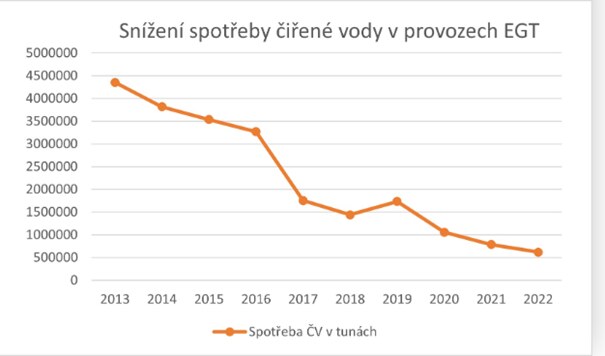Imagine a manufacturing site. Entrance gates, lighted parking lots, a large area with working technology that needs electricity and water, multi-story administrative and huge operational buildings, elevators, fire department facilities, a racing kitchen... All this requires energy, the consumption of which can be compared to a village of 1,000 inhabitants. The days when the energy produced by power plants and heating plants was taken "as if" for free for their own operation are long gone. After all, we are the same energy consumers as anyone else, and in addition, the more such a factory saves, the more it can supply to customers.
 "We are very good at the efficiency of energy production, we want to be good at the efficiency of its use for our own consumption.", Miroslav Krpec - Chairman of the Board and CEO of Energotrans.
"We are very good at the efficiency of energy production, we want to be good at the efficiency of its use for our own consumption.", Miroslav Krpec - Chairman of the Board and CEO of Energotrans.
The company Energotrans, which produces heat for half of Prague, Neratovice, Mělník and other municipalities, has been systematically devoted to the economic use of energy for self-consumption for 5 years. Energotrans introduced rationalization measures that really work. Jiří Pelák leads the savings program here.
"Mother nature gives us energy. As an energy engineer, I would be ashamed if I didn't know how to manage it," says Jiří Pelák, adding: "I see the return on investment in cost-saving measures as saved energy that reached the customer and earned us money."
How to manage energy losses?
Some measures are based on the logic of the matter. As the equipment shrinks or is shut down, it pays to focus on heating branches whose operation is no longer efficient, as they only provide heat for distant small objects and are highly lossy.
"We focus on modifying the heating branches, shortening them, or shutting them down completely, and we are introducing the replacement of efficient heating in the remaining buildings. We deal with the idea of moving departments, changing rooms and workshops so that the use of buildings is as efficient as possible. We also offer the same to our suppliers who rent premises from us in more distant buildings. Thanks to this, we can blind the unused heating branches and avoid unnecessary waste. The expansion of the measurement of own heat consumption is also related to the modifications of heat networks. We have put remote transmissions into operation from these heat meters, which allows us to significantly improve the continuous optimization of our own consumption," Jiří Pelák lists some of the measures.
The Energotrans/Elektrárna Mělník heating plant was put into operation in the early 1960s, and a significant part of the heating distributions date from that time, the technical condition of which is no longer up to date. However, the modernization is logically subject to the future development of the location and aging technologies, which are gradually being phased out. "We always have to evaluate what is worthwhile and what is not," says Jiří Pelák. In addition, all measures can only be implemented in the summer, when the location does not have to supply heat to customers.
The cost-saving measures also concern the production process itself
For example, the annual specific consumption of additional demineralized water in EGT1, which is used for making up the steam water circuits of boilers, has decreased from 401,000 tons in 2013 to 151,000 tons in 2022. The consumption of clarified water has decreased from 4,356,000 tons in 2013 to 619 000 tons in 2022. In addition, the location has largely replaced the clarified water with raw water, which is not associated with chemical treatment, and this significantly reduces production costs and the energy intensity of the process.
"This year, we intend to open another chapter of rationalization measures, regarding the optimization of the consumption of compressed air, which is used for a wide range of applications, including the transport of ash from electro-separators," Jiří Pelák enumerates.

The numbers speak clearly
In the past, the own heat consumption in the power plant was unbearable. "In 2018, we consumed almost 206 thousand GJ, in 2022 it will be only 66,531 GJ, this is the result of the hard work of technicians united in a small interdepartmental work team to optimize the internal system of central heat supply," says Jiří Pelák with a smile, adding: "We have been evaluating savings across all our operations on a monthly basis for five years now. We do our best to reduce the energy intensity of our production and support processes, and thus emissions and losses. The above-mentioned annual own heat consumption decreased by 139,447 GJ compared to 2018, this represents operating costs in the cost price set for this year of CZK 59,962,000 million and an annual reduction of CO2 emissions by 13,086 tons. In this way, we fulfill the goals of ecological and energy management to which our company is committed."
We're not there yet
The location turned to savings experts, which are the ČEZ ESCO Group and their subsidiary Domat.
"Colleagues from ČEZ ESCO and Domat prepared for us two studies of the repair of thermal equipment used for heating all more than 40 buildings in the Energotrans complex. The goal is to complete the project of perfect continuous optimization of own thermal energy consumption using remote data transmission from all heat meters, and in addition to introducing remote regulation of heat consumption from one operator's workplace," says Jiří Pelák. The conclusions from the studies were "recast" into the entry of a nominal action in the TIPOM investment preparation system. "We believe that in the shortest possible time we will see the implementation of the necessary modernization measures and thus the implementation of cost-saving measures in this area," concludes Jiří Pelák.